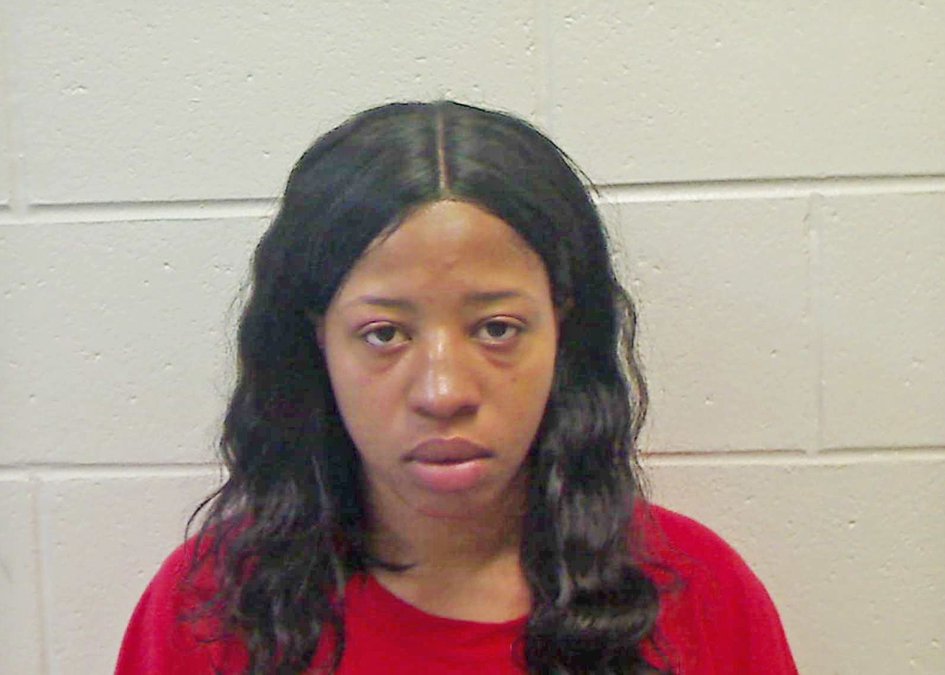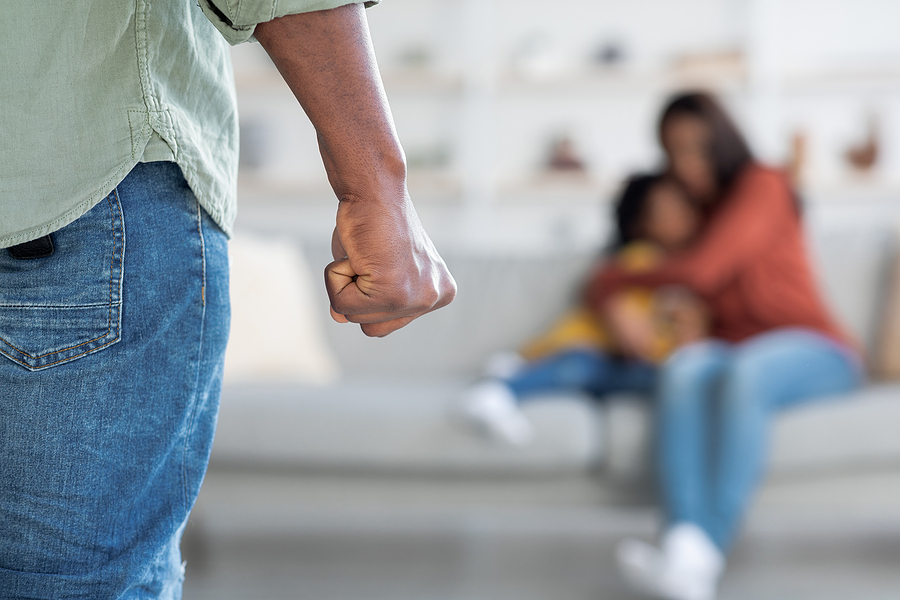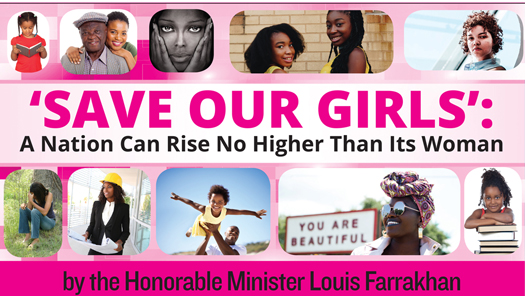Ashlyn Griffin was a few weeks pregnant with her second child when a domestic violence incident occurred. On June 5, 2020, the Black mother fired two shots at her boyfriend, Brandon McCray, during a dispute at their home in Bulloch County, Georgia. In the eyes of her family, friends and supporters, she killed her abuser. In the eyes of the court of law, she was found guilty in February of one count of aggravated assault and one count of possession of a firearm during the commission of a crime.
According to The Georgia Virtue, in 2018, Statesboro, Georgia, police charged Mr. McCray with aggravated assault for beating Ms. Griffin while she was pregnant with their first child. “At the time, he choked, strangled, and then kicked Griffin in the stomach,” the publication says.

The mother of two has been incarcerated at a women’s facility in Georgia and is seeking a new trial, according to updates on a GoFundMe page started by her mother, Tina Griffin.
“Now the State of Georgia wants to add my daughter’s name to the long list of women who went from being abused in the home, to being abused and imprisoned by our justice system, just for defending themselves,” Tina Griffin argues. “Why do Stand Your Ground laws only seem to apply to certain men in this country? Meanwhile, women like my daughter are not allowed to defend themselves, even when violently attacked.”
The story of Ashlyn Griffin is not an anomaly. Black women and girls all over the country are fighting for their lives in the court system for killing their abusers. Too often, victims of domestic abuse and sex trafficking are criminalized and penalized when they take matters into their own hands.
The Honorable Minister Louis Farrakhan of the Nation of Islam has always instructed Black women and girls to fight back against abuse. “We don’t like to see men abusing women,” the Minister stated in a message, “Save Our Girls: A Nation Can Rise No Higher Than Its Woman.”
“The Honorable Elijah Muhammad gave us a law that no man strikes his wife. How are you going to beat the woman that produces your future? Men should be ashamed to abuse women, but most men who beat and bruise women, yet want sex with them the same night they beat them. Men want to beat women like they are inanimate objects, like trees or a lamppost that a dog will lift its leg to; like women do not have feelings,” the Minister stated in another message titled, “Abuse of the Female.”
“Do you think after you beat up a woman that she really wants to give herself to you? Why would you want to take pleasure from someone to whom you have given so much pain?”
Racial and gender disparities
Stand Your Ground and self-defense laws are not applied equitably to Black women, and they are not designed to protect survivors of domestic violence, says a March 2021 report by the Coalition to Stop Gun Violence, titled, “Stand Your Ground Laws Increase Gun Violence and Perpetuate Racial Disparities.”
“Most violence against women is perpetrated by a known acquaintance or partner and occurs in the home. Stand your ground laws do not apply to violence that occurs in the home between two people who live together. Likewise, the self-defense statutes that apply to domestic violence situations in the home make it hard for victims of domestic abuse to successfully claim self-defense,” the report says.

“Under stand your ground, often women who can prove that they have been repeatedly attacked by their partner are not afforded the same self-defense protections as someone (usually a White man) who shoots a stranger in public and claims self-defense. This is especially true for Black women who face both the gender and racial discrimination that is rooted in the criminal justice system.”
In a February 2020 briefing report by the U.S. Commission on Civil Rights, Ahmad Nabil Abuznaid representing the Dream Defenders testified on how women in domestic violence situations are disproportionately impacted by stand your ground.
“In a recent analysis of FBI homicide data prepared by the Urban Institute comparing stand your ground and non-stand your ground states and examining the use of stand your ground laws in cases involving women defendants, 13.5 percent of cases where a White woman killed a Black man were found justified, whereas in contrast only 2.9 percent of cases where a Black woman killed a White man were found justified,” he said.
Tameicsha X, chief financial officer of the organization Silent Crimez out of Dallas, Texas, is a witness to those statistics. In middle school, she was sexually harassed by a boy on a school bus multiple times. One day, she brought her mother’s Swiss Army knife on the bus with her and attempted to stab the young man. When school officials found out, she was expelled from the school and sent to an alternative school. The boy suffered no repercussions for his actions, even after assaulting another girl on the same school bus.
“Yet, here we are, again, blaming the young Black girl who was assaulted, who tried to defend herself,” Tameicsha X expressed, referring to ongoing cases in the news. “So, this has been going on for years. It didn’t start with me. It won’t stop with these young ladies. But it’s like we’re not seen. We’re not heard. And then we get penalized when we try to protect ourselves because no one else will.”
In Iowa, Pieper Lewis, a Black teenager, was recently ordered to pay her alleged rapist’s family $150,000 and was given five years’ probation. She was only 15 years old when she killed her alleged rapist, Zachary Brooks, in 2020. She argued in her plea agreement that she was sex trafficked after running away from an abusive home environment and had been raped repeatedly by Mr. Brooks.
One of her former teachers raised more than $500,000 in a GoFundMe to help the teenager pay the $150,000 in restitution, to remove financial barriers in pursuing college or starting her own business and to give her the financial capacity to explore ways to help other young victims of sex crimes.
“This is a Black girl who clearly was being trafficked, and the juvenile court judge asked for it to go to the adult court. We just don’t even see Black girls who have experienced this harm as children,” said Dr. Sydney McKinney, executive director of the National Black Women’s Justice Institute, to The Final Call.

She commented on the “adultification” of Black girls, especially in cases like Pieper Lewis and Chrystul Kizer. “We have to ask ourselves, why? Why do we have a criminal legal system that refuses to see Black girls as Black girls?” she questioned.
At 17, Chrystul Kizer killed the man she said forced her into sex trafficking. She is now facing a life sentence in Wisconsin. In July, the state’s Supreme Court ruled that the now 22 year old will be allowed to argue self-defense as a direct result of being trafficked.
“Police and other agencies do not see Black women as victims because oftentimes, we’re fighting back. So, we’re not seen as a typical victim like a White woman would be seen, because we’re not cowering in a corner waiting to be assaulted. We’re often fighting back. We’re talking back,” said Crystal Muhammad, lead advocate of The Asha Project.
The Asha Project is a culturally specific organization based in Milwaukee that deals with victims of sexual abuse, domestic violence, sex trafficking and elder abuse. Ms. Muhammad sat in on Chrystul Kizer’s case, which occurred in Kenosha, Wisconsin. The man who abused Chrystul Kizer, Randall Volar, was already under investigation for child sex trafficking and child pornography, and he recorded the abuse of the teenager. He was also abusing about a dozen other underage Black girls at the time.
“Under the law, she was a child, and they convicted her and sentenced her to life in prison,” Ms. Muhammad said. “That’s being overturned now in the Supreme Court case, but she still has to go through the trial, which is crazy. Because we’re not seen as victims. We’re just seen as someone that if we react, we’re the perpetrator, now.”
She noted that Black women are often dehumanized and are not seen as soft, feminine beings who require protection.
“We are the opposite of White femininity, and therefore we are not afforded that same kind of recognition of the kind of harm that we experience,” Dr. McKinney said. “We’re treated differently because we are not perceived as the ideal victim, or deserving victim, or even a victim at all, really.”
Problems with law enforcement
For Danielle X Perkins, founder of Silent Crimez, the way Black women are viewed goes back to the Constitution. She stated when Black women and girls kill their abusers, law enforcement explains it as them having depression and anger issues. Meanwhile, White women, she said, get more attention, more repair, more counseling and more safety.
“A doggone dog has rights. Dogs have rights. You hit a dog, you in trouble. You don’t feed the dog, you’re in trouble. You put the dog in an unconditional or unsafe environment, you get punished for that. But the Black woman does not get the same treatment,” she expressed.
To Ms. Perkins, the first mistake made by law enforcement is not listening.
“When a woman has shot her husband or her boyfriend or just anybody and they ask the question, ‘Well, tell us what happened?’ And she tells her story of how he had hit her or he choked her or hurt the children and they hear her but they don’t listen to what she’s telling them. They go straight and jump into the core of the conversation, which is the murder,” she said.
Sathya Callender from Atlanta is a victim of abuse turned domestic violence advocate. Though she did not fight back, she knows what it’s like to be in Ashlyn Griffin’s situation.
“Do I agree that she should be in prison? Absolutely not. Because now what if he would have took her life? Then what would you have said to her parents or her family? What if she didn’t defend herself? How would that look?” she questioned.
She is now the founder of the nonprofit organization Scars of Survival Inc. and releases a monthly magazine highlighting survivors of domestic violence. She explained that abuse often starts emotionally, mentally and verbally before it escalates into the physical.
“My abuse didn’t start off physical,” she said. “He started off controlling me, calling me names, keeping me from family and friends, saying nobody liked me, nobody loved me. I started believing it. I was in bondage.”
Ms. Callender believes that law enforcement needs to be retrained and that police departments need to have a domestic violence task force. She said she has helped almost 300 families since 2016 and has not heard one good thing about someone calling law enforcement in a domestic violence situation.
“Even when it comes to getting a restraining order, if you go and try to get a restraining order, they’re going to ask you why. And if you say something like well, he threatened to take my life, sometimes that’s not even enough. They want you to have more,” she said. “But here’s the thing. Why would you give a person a restraining order when something severe has happened? A restraining order should be there to prevent something worse from happening. That’s why they’re getting a restraining order, to keep the person from harming them any further.”
Legislation and accountability
Those interviewed by The Final Call agreed Black women need to make their voices heard and Black people need to hold lawmakers and courts accountable.
Ms. Callender wants to get a law passed that would help people like Ashlyn Griffin. She said society needs to become more educated about domestic violence and advised those in abusive situations to leave a paper trail.
“You got to start a paper trail because a lot of times when it comes to defending yourself or fighting for yourself within the justice system, people want to see that paper trail. They want to see the evidence,” she said. “And I feel like if enough evidence is shown and proof is shown of this is what happens when we’re calling the police, this is what happens when X, Y and Z, I think that will start something and help to change things.”
Ms. Perkins was born in the 1980s and witnessed domestic abuse. Her mother was physically abused by her father, and she herself was physically abused by her father and verbally abused by her mother.
“I learned that the loophole is the community and the care,” she said. “We have to learn to care and learn to open our doors. If we see something or you know something, you say something.”
Dr. McKinney and the National Black Women’s Justice Institute are working to advance survivors’ legislation. “That’s legislation that allows judges and prosecutors to take into consideration the kind of harm that Black women and girls who are survivors of gender-based violence experience … taking that into consideration as a mitigating factor during sentencing,” she explained. “And hopefully, helping people understand that rather than punishing people who have experienced harm, that we should be supporting their healing.”
She is also a proponent of attacking the larger social structures that create the conditions in which Black women and girls suffer.
“We can start changing them and create the world that we all want, where Black women and girls can thrive and are joyful and don’t have to be fearful of the harm that they may experience in their homes or in their communities and Black girls don’t have to be afraid of the harm they may experience going to and from school,” she said.
“We can create that world together. But it means that we have to first acknowledge what’s happening so that we can start figuring out what the solutions are, and then our community leads in the creation of those solutions.”













